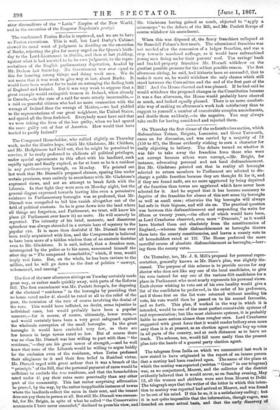The first of the new afternoon sittings on Tuesday certainly
made great way, or rather made quickly away, with parts of the Reform Bill. .The first amendment was Mr. Poulett Scrope's, for disposing of the electoral " residuum " in the boroughs by providing that no house rated under 4/. should be rated at all to the relief of the poor, the remission of the rate of course involving the denial of the vote. This would have inflicted, no doubt, some injustice in individual cases, but would probably have been a popular measure,—for it means, of course, ultimately, lower rents,— and would certainly have been a very great safeguard against the wholesale corruption of the small boroughs. In the great boroughs it would have excluded very few, as there are few houses in large towns rated so low. But of course there was no class Mr. Disraeli was less willing to part with than "the residuum,"—they are his great tower of strength,—and he well knew that none of the Liberals would be willing to argue boldly for the exclusion even of the residuum, when Tories professed their allegiance to it and their firm belief in Residual virtue. Mr. Disraeli urged with great ardour that it was a breach of the " principle " of the Bill, that the personal payment of rates would be sufficient to exclude the true residuum, and that the householders rated under 4/. pay their rates more punctually than any other part of the community. This last rather surprising affirmation he proved, by the way, by the rather inapplicable instance of towns where the landlords collect the rates in their rent, and the tenant does not pay them in person at all. But still Mr. Disraeli was success- ful, for Mr. Bright, in spite of what he called "the Conservative sentunents I have never concealed," declined to press his view, and
Mr. Gladstone having gained so much, objected to "apply a microscope" to the defects of the Bill, and_Mr. Poulett Scrope of course withdrew his amendment.






























 Previous page
Previous page